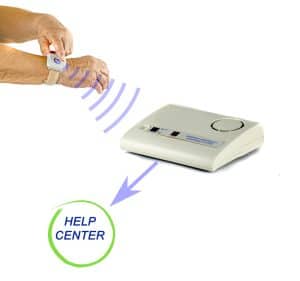
You can enjoy more freedom and peace of mind when you use a mobile medical alert device.
Choosing the right medical alert system can be difficult, especially when so many options are available. However, it is essential to find a system and device that will support you or your loved one and give you the assistance and peace of mind you deserve. Understanding your options can help you determine which type of system might fit best in your situation.
Mobile and at-home medical alert systems are the two major types of systems. Each one has its own benefits and drawbacks. Here’s what you need to know about these two types as you begin to narrow down your choices.
What’s the Difference Between In-Home and Mobile Medical Alert Systems?

An in-home system limits the user to so many square feet in order to receive assistance.
In-home medical alert systems and mobile medical alert systems are both designed to provide assistance and support to a user who has fallen or is experiencing another type of emergency. However, that is where the similarities end.
An in-home system is hooked up through a landline (or cellular connection) and requires a base station. The user can wear a wearable device, such as a pendant, and push that button when they need assistance. The base system takes care of calling the trained operators for support. Unfortunately, the in-home systems typically only covers so many square feet which means if you or your loved one steps out of range to garden, visit on the porch with a neighbor, or go to the grocery store, they will not be able to reach emergency assistance if they push their pendant.
In contrast, mobile alert systems connect through LTE cellular services and sometimes WiFi. This means that when the user pushes their pendant for assistance, they can quickly receive it thanks to these wireless technologies. The pendant also works as a communication device, completely eliminating the need for a base system back at home. Most mobile medical alert systems also leverage GPS technology so that first responders can find the user more easily.
How Do Mobile Medical Alert Systems Work?
Essentially, mobile medical alert systems work through LTE cellular technology. The user still wears a device, such as a pendant or watch, that has an emergency button on it. When the user needs assistance, they push the button and then communicate verbally with a trained operator through the pendant. Some mobile alert systems feature fall detection technology, which can sense when a potential fall has taken place. When this happens, an operator can reach out immediately to the person via their pendant to see if they are okay and begin an assessment.
Where Can I Use a Mobile Medical Alert System?
Thanks to a strong network of cellular providers, people who use a mobile medical alert system can receive assistance almost anywhere. As long as you have cell phone service, you can rest assured that your emergency button should work.
Advantages of Mobile Medical Alert Systems
Mobile medical alert systems offer more freedom and more peace of mind to users and their loved ones. The majority of older adults do not spend their entire day in their homes. In fact, most are out and about in the backyard, taking a stroll in the neighborhood, swimming laps at the local pool, or meeting up with friends for coffee. A mobile system allows the user to feel confident that they can receive assistance from their medical alert system no matter where they are.
Mobile medical alert systems also offer fall detection technology and use GPS. Both of these factors increase safety and faster emergency response.
Do Mobile Medical Alert Systems Cost More than Other Help Button Systems?
Yes. Mobile medical alert systems typically cost about $10 more per month than the traditional in-home system. However, if you can afford the extra fee and are active outside the home, you will benefit from that enhanced freedom and peace of mind.
Cell Phone Medical Alert Systems
Some adults believe they do not need a mobile medical alert system because they have cell phones. While a cell phone certainly comes in handy to dial 9-1-1 in case of an emergency, a medical alert device is easier to tote around in certain places, like the shower, bathroom, and swimming pool.
Do I Need a Medical Alert System That Offers Mobility Outside the Home?
Depending on your current lifestyle, you might find that a mobile medical alert system offers you more freedom when you are running errands, driving, meeting up with friends, or even taking public transportation to your doctor appointments. If you or your loved one are mostly home-bound, you might decide that an in-home system works better for you (and costs less). Also, mobile medical alerts require recharging where most home-based units do not.
If you aren’t sure which option could be best for you or your loved one, speak about it with their physician and the medical alert company rep.
Compare Other Medical Alert Options/Price Comparison
Now that you have determined if an in-home or mobile medical alert system is best for you, it’s time to begin researching the options available. Be sure to check out our extensive reviews about medical alert companies out there as well as to use our comparison tool to look at your final options side-by-side.
Then, you can call representatives of the medical alert companies you are interested in to learn more about their mobile or in-home system options, features, and prices. Be sure to keep a list of questions you think of so that you can ask them when you are connected.


